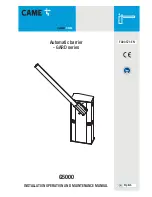
11
4 Mounting
OPTISWITCH 3100 C • Relay (DPDT)
29953-EN-210702
Fig. 2: Measures against moisture ingress
Do not hold OPTISWITCH 3100 C on the vibrating element. Espe-
cially with flange and tube versions, the sensor can be damaged by
the weight of the instrument.
Remove the protective cover just before mounting.
The process fitting must be sealed if there is gauge or low pressure
in the vessel. Before use, check if the sealing material is resistant
against the measured product and the process temperature.
The max. permissible pressure is specified in chapter "
Technical
data
" or on the type label of the sensor.
The vibrating level switch is a measuring instrument and must be
treated accordingly. Bending the vibrating element will destroy the
instrument.
Warning:
The housing must not be used to screw the instrument in! Applying
tightening force can damage internal parts of the housing.
Use the hexagon above the thread for screwing in.
Metric threads
In the case of instrument housings with metric thread, the cable
glands are screwed in at the factory. They are sealed with plastic
plugs as transport protection.
You have to remove these plugs before electrical connection.
NPT thread
In the case of instrument housings with self-sealing NPT threads, it is
not possible to have the cable entries screwed in at the factory. The
free openings for the cable glands are therefore covered with red dust
protection caps as transport protection.
Prior to setup you have to replace these protective caps with ap-
proved cable glands or close the openings with suitable blind plugs.
4.2 Mounting instructions
The vibrating element should protrude into the vessel to avoid
buildup. For that reason, avoid using mounting bosses for flanges
Transport
Pressure/Vacuum
Handling
Cable entries - NPT
thread
Cable glands
Mounting socket












































